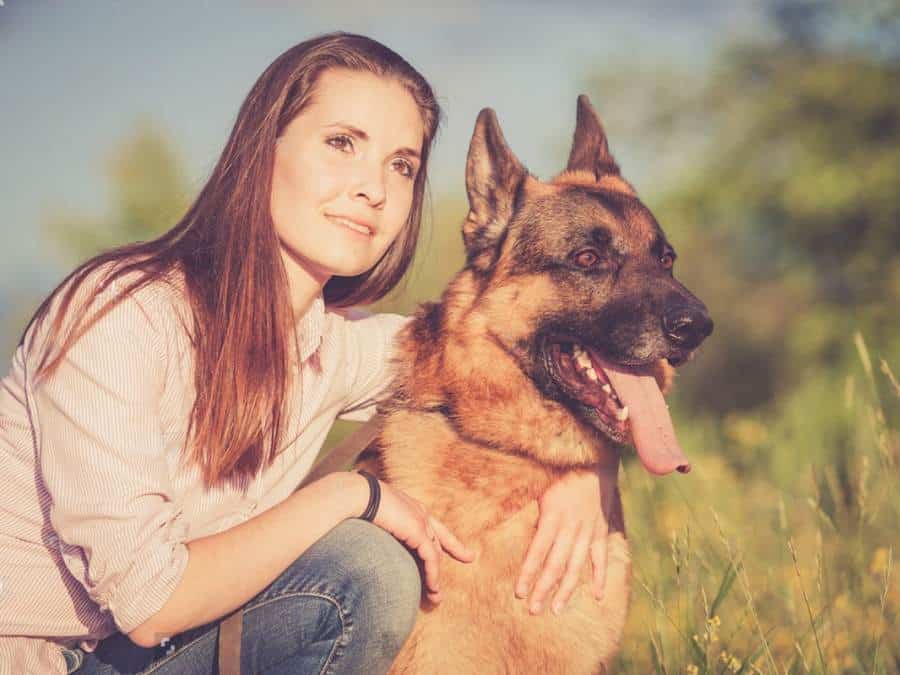“What Is The Best Age To Adopt A German Shepherd” is a common question among those who are ready to welcome these intelligent and loyal companions into their homes.
From considering your lifestyle and schedule to understanding the unique needs of German Shepherds at different stages of their life, there are various factors to weigh in this decision-making process.
It’s not always an easy decision, so let’s take a look at the advantages and disadvantages of adopting German Shepherds of different ages.
What is the Best Age to Adopt a German Shepherd
The best age to adopt a German Shepherd depends on your lifestyle and readiness. Puppies require more time, care, and training due to their high energy levels and need for socialization. Adults and senior dogs are often more settled, requiring less intensive training and exercise.
Consider your ability to meet the specific needs of different age groups before making a decision.
For instance:
- If you’re frequently away from home or work long hours, or don’t want the burden of training a puppy, an adolescent, adult, or senior dog might be more suitable as they often require less constant supervision compared to puppies.
- On the other hand, if you have ample free time and patience for housebreaking and obedience training exercises like sit-stay-come commands with treats in hand—then adopting a puppy could be rewarding.
RELATED: How to Rescue & Transition a German Shepherd Into Your Family

Pros & Cons of Adopting a German Shepherd Puppy
Pros of Adopting a Puppy
- Blank Slate for Training:
- Puppies are like sponges, ready to soak up everything you teach them. Training is often easier when starting from a young age.
- Bonding from the Beginning:
- Adopting a puppy allows you to build a strong bond right from the start. You become their primary influence and source of comfort.
- Longer Lifespan Together:
- Puppies have a longer lifespan ahead, meaning more years of companionship and shared adventures with your furry friend.
- Customized Socialization:
- You have the opportunity to shape your puppy’s social skills by exposing them to various environments, people, and other animals.
- Playful Energy:
- Puppies bring a contagious enthusiasm and playful energy that can be uplifting and entertaining.
RELATED: Should I Adopt A German Shepherd
Cons of Adopting a Puppy
- Time-Intensive:
- Puppies demand a lot of time and attention for training, socialization, and care. Be prepared for a significant time commitment. (Source)
- Housebreaking Challenges:
- Housebreaking a puppy can be a challenging process, requiring patience and consistent training.
- Teething and Destructive Behavior:
- Puppies go through a teething phase, and they may chew on things. Your favorite shoes might become casualties!
- Uncertain Adult Personality:
- While you can influence their behavior through training, a puppy’s adult personality is not fully predictable.
- Initial Vet Costs:
- The first few months involve vaccinations, spaying/neutering, and other initial veterinary costs that can add up.
Adopting a puppy is a rewarding but demanding experience. It requires dedication, patience, and a willingness to invest time in training and care.
RELATED:

Pros & Cons of Adopting an Adolescent or Adult GSD
Pros of Adopting an Adolescent or Adult Dog
- Known Personality:
- Unlike puppies, adult dogs have a more established personality, allowing you to choose a companion whose temperament matches your lifestyle.
- Potential for Faster Training:
- Adolescents and adults may have a longer attention span, making training sessions potentially more efficient compared to younger puppies.
- Possible Previous Training:
- Many adult dogs may have basic training or socialization experience, simplifying the transition into your home.
- Reduced Energy Levels:
- Adult dogs generally have lower energy levels than puppies, making them suitable for individuals or families with a more relaxed lifestyle.
- Physical Maturity:
- The dog’s size and physical characteristics are already apparent, avoiding surprises related to growth that often accompany puppyhood.
RELATED:
Cons of Adopting an Adolescent or Adult Dog
- Unknown Past Experiences:
- Adopting an adult dog might mean not knowing their complete history, including any past traumas or behavioral issues.
- Potential Behavioral Challenges:
- Adult dogs may come with established habits that could be challenging to change, requiring patience and consistent training.
- Adaptation Period:
- It might take time for an adult dog to adjust to a new environment, family, and routine, potentially leading to initial behavioral challenges.
- Possibly Shorter Lifespan Together:
- Depending on the age at adoption, the time you have with your adult dog may be shorter than if you had adopted a puppy.
- Health Considerations:
- Some adult dogs may have pre-existing health conditions that require ongoing care, and veterinary costs could be a factor.
Adopting an adolescent or adult dog provides a more immediate understanding of their personality and characteristics. While there may be some challenges, the experience can be incredibly rewarding as you offer a loving home to a dog in need.
RELATED:

Pros & Cons of Adopting a Senior German Shepherd
Pros of Adopting a Senior German Shepherd
- Calm Demeanor:
- Senior dogs tend to have a calmer demeanor, making them an excellent choice for households seeking a more relaxed companion.
- Predictable Size and Personality:
- Unlike puppies, senior dogs have fully developed personalities and physical characteristics, allowing for a more accurate match to your preferences.
- Lower Energy Levels:
- Senior dogs generally have lower energy levels, making them a good fit for individuals or families with a more laid-back lifestyle.
- Grateful Companionship:
- Many senior dogs end up in shelters due to unforeseen circumstances, and they often show immense gratitude for a second chance at a loving home.
- Reduced Training Demands:
- Seniors often come with basic training and may require less time and effort in training compared to puppies or adolescents.
RELATED: Pros & Cons of Adopting a Senior German Shepherd
Cons of Adopting a Senior German Shepherd
- Health Considerations:
- Senior dogs may have age-related health issues, requiring ongoing veterinary care and potential additional expenses.
- Shorter Time Together:
- Adopting a senior dog means you might have a shorter time together compared to a younger dog, and saying goodbye sooner can be emotionally challenging.
- Unknown Past:
- Similar to adopting an adult dog, you may not have full information about a senior dog’s past experiences, potentially including health issues or behavioral concerns.
- Limited Socialization:
- Some senior dogs may have limited exposure to new experiences or may not be as adaptable to change compared to younger dogs.
- Adjustment Period:
- It may take time for a senior dog to adjust to a new home, routine, and family, and they might initially exhibit signs of stress or anxiety.
Adopting a senior dog can be incredibly rewarding, offering a chance to provide a loving home during their golden years. While there may be some challenges, the joy of giving a senior dog a comfortable and caring environment often outweighs the drawbacks.

How to Decide What Age German Shepherd I Should Adopt?
Deciding what age German Shepherd to adopt involves considering your lifestyle, preferences, and ability to meet the specific needs of different age groups. Here’s a step-by-step guide to help you make this decision:
- Assess Your Lifestyle:
- Assess your daily routine, activity level, and living situation. Puppies require a significant time commitment for training and socialization, while adult and senior dogs may be better suited for a more relaxed lifestyle.
- Evaluate Your Energy Level:
- Be honest about your energy level and the amount of physical activity you can provide. Puppies and adolescents usually have higher energy levels, requiring more playtime and exercise.
- Training Commitment:
- Consider your willingness and ability to invest time in training. Puppies need consistent training from the start, while adult dogs may come with some training or require additional adjustments.
- Space and Living Arrangements:
- Evaluate your living space. Puppies and more active dogs may need ample space to play, while senior dogs may be more adaptable to smaller living quarters.
- Allergies or Sensitivities:
- Consider any allergies or sensitivities within your household. Some people may be more susceptible to allergies with younger dogs, while senior dogs might be a better fit in such cases.
- Companionship Goals:
- Reflect on the type of companionship you’re seeking. Puppies may provide years of playful energy, while senior dogs may offer a calm and grateful presence.
- Health Considerations:
- Assess your ability to handle potential health issues. Puppies may need vaccinations and preventive care, while senior dogs may require more frequent veterinary visits.
- Previous Dog Experience:
- Your experience with dogs can influence your decision. If you’re a first-time dog owner, a more mature dog might be a good starting point.
- Emotional Readiness:
- Reflect on your emotional readiness for the challenges and joys associated with different age groups. Puppies demand patience, while senior dogs offer unique and heartwarming experiences.
- Visit Shelters:
- Spend time at local shelters interacting with dogs of different ages. Observe their behavior, personality, and how well they match your preferences.
Ultimately, the best choice depends on your preferences, lifestyle, and ability to meet the needs of your future canine companion. Take your time to visit shelters, spend time with different dogs, and ask questions to make a decision that aligns with your capabilities and desires.
Final Remarks
You’ve now explored the various aspects of adopting a German Shepherd at different ages, weighing the pros and cons of each stage. Whether you’re considering a playful puppy, a mature adult, or a wise senior dog, it’s crucial to align your decision with your lifestyle and capabilities. Remember, the best age to adopt a dog ultimately depends on your readiness to provide love, care, and attention. So, take the time to reflect on your circumstances and make an informed choice that will benefit both you and your future furry companion.
FURTHER READING:




